Book 1 Unit 3 完型语法
人教版高中英语 语法复习:必修1Unit3语法剖析

语法复习:必修1Unit3语法剖析现在进行时表将来1.概要当句子涉及确切的计划、明确的意图和为将来安排好的活动时,现在进行时可用于表示将来,表示将来意义的现在进行时根据句中表示时间的词语或上下文来确定。
表示将来用进行时的小口诀:巧记歌诀进行时,很好记:be加“动词ing”。
be表时态是“现在”,be要随着主语易。
某点阶段用进行,动词必是延续性,动词若是非延续,最近将来时常用。
2.表现在形式现在进行表将来,通常为:is+v.-ing注意:come, go, stay, arrive和leave等动词的现在进行时经常用于表示将来确切的计划。
表示交通方式、行程安排的动词。
如:fly, walk, ride, drive和take (a bus, a taxi等)的现在进行时也经常用于表示将来。
但是,像rain这样的动词的现在进行时通常不表示将来时间,因为一般来说,下雨不是一个事先计划好的事件。
3.现在进行时表示将来问句1)When are you leaving?你什么时候动身?2)How are you going there?你怎样去哪儿?3)Where are you staying?你将待在哪儿?4)How long are you staying there?你将待在那儿多久?5)When are you coming back?你啥时候回来?【活学活用】13.用动词的适当形式填空1)You _______ (stay) with us this weekend.2)We _______ (leave) soon, Mr Lee.3)She thinks he _______ (die).4)They _______ (go) to Shanghai this Friday.5)Tom _______ (come) here next week.6) The train_______ (arrive) in three hours.答案:1)are staying 2)are leaving 3)is dying 4)are going 5)is coming 6) is arriving。
高中英语必修一课文详解Book_1-unit_3
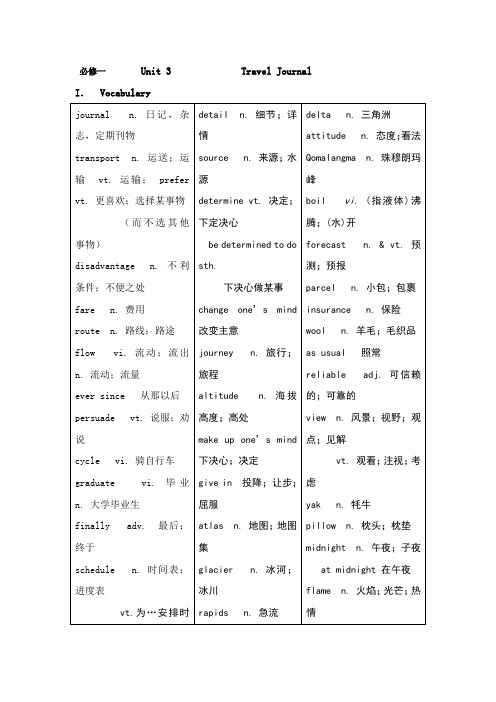
必修一Unit 3 Travel Journal I. VocabularyII. Reading JOURNEY DOWN THE MEKONGPART I THE DREAM AND THE PLAN梦想和计划My name is Wang Kun.译文:我叫王昆。
Ever sinc e middle school, my sister Wang Wei and I have dreamed about taking a great bike trip.译文:自从上中学后,我和姐姐王伟一直梦想进行一次长途自行车旅行。
【注释:①ever since“从那时起,自那以后”,往往与现在完成时连用。
②dream about梦见,梦到,梦想,向往。
如:1) She dreamed about a handsome young prince coming to rescue her from her misery.她梦见一个年轻英俊的王子走来把她从苦难中救出。
2)He got the first place this time, but he never dreamed about it.这回他得了第一名, 但他做梦也没想到。
3) Many people dream about living on an island in the South Seas.许多人向往在南海的一个岛上生活。
③dream of梦见;渴望,梦想。
如: 1) I often dreamed of my younger brother soon after I left home.刚离开家时, 我常梦见弟弟。
2)He has dreamed of a trip to Beijing.他曾做梦到北京旅行。
3) I never dreamed of such a thing.我从没梦想过这样的事情。
4)I've long dreamed of paying a visit to theGreat Wall.我一直渴望游览长城。
高中英语课堂笔记必修1 Unit 3
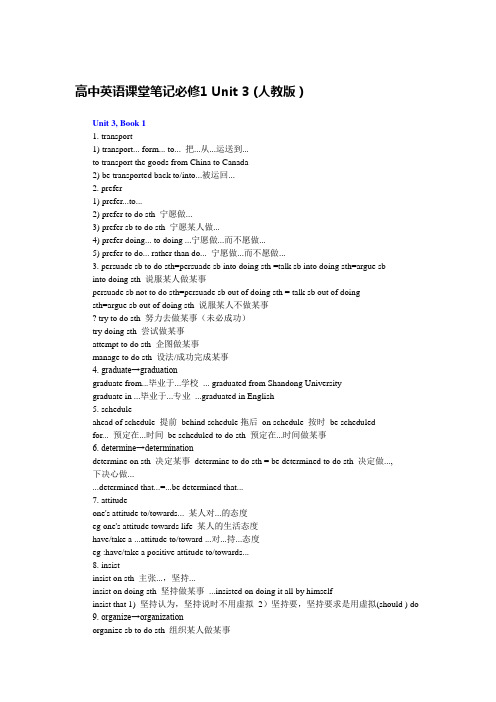
高中英语课堂笔记必修1 Unit 3 (人教版)Unit 3, Book 11. transport1) transport... form... to... 把...从...运送到...to transport the goods from China to Canada2) be transported back to/into...被运回...2. prefer1) prefer...to...2) prefer to do sth 宁愿做...3) prefer sb to do sth 宁愿某人做...4) prefer doing... to doing ...宁愿做...而不愿做...5) prefer to do... rather than do... 宁愿做...而不愿做...3. persuade sb to do sth=persuade sb into doing sth =talk sb into doing sth=argue sbinto doing sth 说服某人做某事persuade sb not to do sth=persuade sb out of doing sth = talk sb out of doingsth=argue sb out of doing sth 说服某人不做某事? try to do sth 努力去做某事(未必成功)try doing sth 尝试做某事attempt to do sth 企图做某事manage to do sth 设法/成功完成某事4. graduate→graduationgraduate from...毕业于...学校... graduated from Shandong Universitygraduate in ...毕业于...专业...graduated in English5. scheduleahead of schedule 提前behind schedule拖后on schedule 按时be scheduledfor... 预定在...时间be scheduled to do sth 预定在...时间做某事6. determine→determinationdetermine on sth 决定某事determine to do sth = be determined to do sth 决定做...,下决心做......determined that...=...be determined that...7. attitudeone's attitude to/towards... 某人对...的态度eg one's attitude towards life 某人的生活态度have/take a ...attitude to/toward ...对...持...态度eg :have/take a positive attitude to/towards...8. insistinsist on sth 主张...,坚持...insist on doing sth 坚持做某事...insisted on doing it all by himselfinsist that 1) 坚持认为,坚持说时不用虚拟2)坚持要,坚持要求是用虚拟(should ) do9. organize→organizationorganize sb to do sth 组织某人做某事organize sth 组织某事eg;organize a meeting/a discussion10. care about sth/doing sth 关心...,在乎...,担忧...eg:He doesn't seem care about the coming exam.care for 喜欢... eg: He doesn't care much for television. 他不怎么爱看电视11. change one's mind 改变主意change one's mind about sth/doing sth 改变做某事的主意12. make up one's mind 下定决心decide to do sth决定做某事=determine to do sth13. give in (to...) 向...屈服/让步/投降give up sth/doing sth 放弃、戒掉give up smoking/drinking 戒烟/戒酒give sth in to sb =hand in sth to sb 把...交给/呈给某人eg: ... gave the report in to the teacher/chief editor ...呈交给老师/主编14. put up one's hand 举手put up here for the night 在这里过夜put up a short play 表演短剧put up more singers 推出更多歌手put up a tent 搭建帐篷put sb up for a position 提名/推荐某人就认某职put up with 忍受、容忍eg:The just could not put up with such an insult. 他们简直无法忍受这样的侮辱put up the map on the wall 把地图贴在墙上15. since 1) 主语+have/had done +since +一般过去时eg: We haven't seen each other since we departed 20 years ago.2) It is +时间段+since+主语+一般过去时eg:It is three years since he worked here.3)It was + 时间段+since+主语+ 过去完成时eg: It was three years since he had worked here.16. get sth doing =have...doing 使...处于doing 状态eg: get/have the water runningget sb to do sth =have/make sb do sth让某人做某事eg:get the students to recite the text17. 主语+be+adj+to do=It be +adj +to do stheg: This question is hard to answer.=It is hard to answer this question.18. the way to do sth= the way of doing sth 做某事的方法eg: the way to solve the problem=the way of solving the problem......a/the way (that/in which) ,a/the way 做先行词时,定语从句常用that/in which 引导并可省略是否也看看:2012各地高考试题及答案高考英语真题牛津版重点词汇/词组/句子外研版高中英语高频考点高考志愿/院校填报高考英语语言点牛津版高中英语必考点高中英语学法指导高三总复习讲座高中英语总复习复习串讲牛津版高中英语重点词组高考疑难指津人教版高一英语复习高考模拟/名校试题英文诗/美文/著名演讲新概念英语人教版高二英语复习高考英语语法书画艺术与保健相关教学网站人教版高中课堂笔记高考综合资讯高考词。
Book 1unit3完形填空
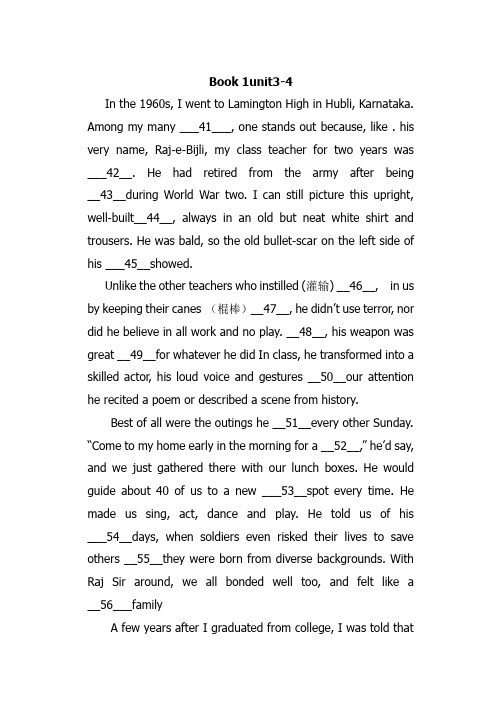
Book 1unit3-4In the 1960s, I went to Lamington High in Hubli, Karnataka. Among my many ___41___, one stands out because, like . his very name, Raj-e-Bijli, my class teacher for two years was ___42__. He had retired from the army after being __43__during World War two. I can still picture this upright, well-built__44__, always in an old but neat white shirt and trousers. He was bald, so the old bullet-scar on the left side of his ___45__showed.Unlike the other teachers who instilled (灌输) __46__, in us by keeping their canes (棍棒)__47__, he didn’t use terror, nor did he believe in all work and no play. __48__, his weapon was great __49__for whatever he did In class, he transformed into a skilled actor, his loud voice and gestures __50__our attention he recited a poem or described a scene from history.Best of all were the outings he __51__every other Sunday. “Come to my home early in the morning for a __52__,” he’d say, and we just gathered there with our lunch boxes. He would guide about 40 of us to a new ___53__spot every time. He made us sing, act, dance and play. He told us of his ___54__days, when soldiers even risked their lives to save others __55__they were born from diverse backgrounds. With Raj Sir around, we all bonded well too, and felt like a __56___familyA few years after I graduated from college, I was told thatRaj Sir had __57__. I was very __58___. It was hard to imagine that someone so lively was no more. Mr Raj-e-Bijli taught by example that it isn’t __59__to provide for oneself and one’s family; it’s __60___as important to help and nature others.41.A. friends B. teachers C. classmates D. brothers42. A. rich B. cheated C. unusual D. serious43. A. wounded B. served C. cheated D. reported44. A. doctor B. soldier C. cook D. actor45. A. face B. chest C. back D. head46. A. shame B. anger C. fear D. surprise47. A. clean B. handy C. pretty D. smooth48. A. Instead B. Besides C. However D. Therefore49. A. sympathy B. courage C. enthusiasm D. patience50. A. transferring B. requiring C. avoiding D. grabbing51. A. attended B. cancelled C. organized D. postponed52. A. B. picnic C. lesson D. party53. A. risky B. scenic C. strange D. noisy54. A. school B. work C. rest D. army55. A. even though B. since C. as D. unless56. A. poor B. close C. royal D. small57. A. turned away B. looked away C. passed away D. run away58. A. proud B. sad C. worried D. tired59. A. enough B. wrong C. easy D. normal60. A. even B. still C never D. just。
人教版必修一Book 1Unit 3知识点整理
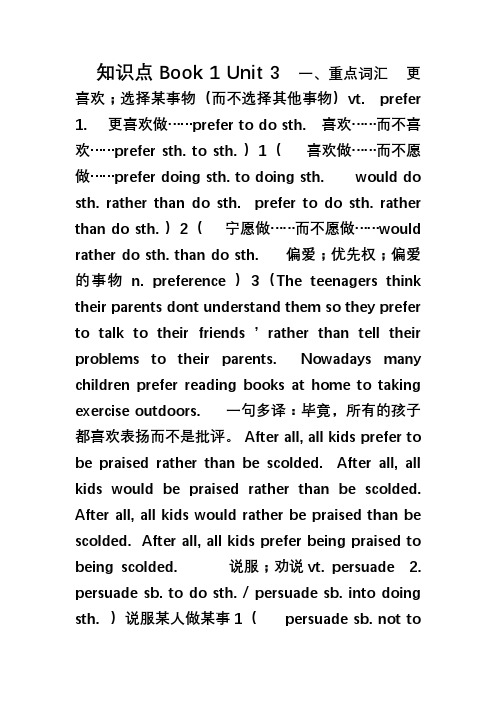
知识点Book 1 Unit 3一、重点词汇更喜欢;选择某事物(而不选择其他事物)vt. prefer 1. 更喜欢做……prefer to do sth. 喜欢……而不喜欢……prefer sth. to sth. )1(喜欢做……而不愿做……prefer doing sth. to doing sth. would do sth. rather than do sth. prefer to do sth. rather than do sth. )2(宁愿做……而不愿做……would rather do sth. than do sth. 偏爱;优先权;偏爱的事物n. preference )3(The teenagers think their parents dont understand them so they prefer to talk to their friends ’ rather than tell their problems to t heir parents. Nowadays many children prefer reading books at hometo taking exercise outdoors. 一句多译:毕竟,所有的孩子都喜欢表扬而不是批评。
After all, all kids prefer to be praised rather than be scolded. After all, all kids would be praised rather than be scolded. After all, all kids would rather be praised than be scolded. After all, all kids prefer being praised to being scolded. 说服;劝说vt. persuade 2. persuade sb. to do sth. / persuade sb. into doing sth. )说服某人做某事1( persuade sb. not to do sth. / persuade sb. out of doing sth. )说服某人不做某事2(try to persuadesb. to do sth. / advise sb. to do )试图说服某人做某事(但未必说服成功)3(sth. t really want. ’t let yourself be persuaded into buying things you don’Don He tried to persuade me to give up smoking, but in vain. 为某事安排时间vt. 时间表;进度表n. schedule 3. 按期,准时 on schedule )1(晚于预定时间/提前ahead of/ behind schedule 预定做某事be scheduled to do sth. )2( She is scheduled to give a speech tonight, hoping all of us will attend it. vt. determine 4. 决定;确定;下定决心决定做某事(表示动作)determine to do sth. )1((表示状态)决心做某事be determined to do sth. 有决心的坚决的;adj. determined )2(决心n. determination )3( vt. 风景;视野;观点,看法;见解n. view 5. 观看;注视;考虑 On the other hand, some students hold the view that labor education will take up their time, 观点,看法n . which will be spent studying. If we go on a trip abroad, we can broaden our view and gain knowledge we cannot get from 视野n. books. 风景n. He climbed up to the top of the church tower to get a better view of the entire city. 观看v. I got anopportunity to view the movie before it was released. 关心;忧虑;惦念;在乎care about 6.)1(照料/喜欢;照顾 care for 照料/处理;照顾take care of 当心take care )2(t care about what others said. ’The little girl cared for the poor old man day and night and didn这位小女孩日夜照顾这个贫穷的老人,她不在意其他人说什么。
人教版高中英语Book1Unit3教案
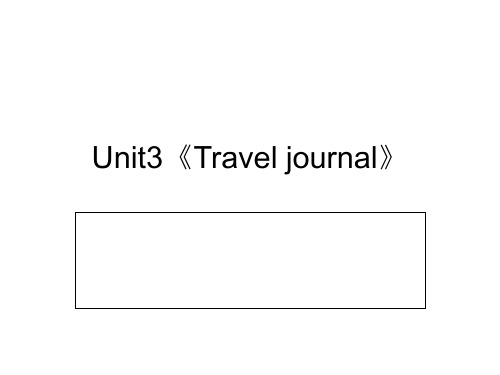
• ____________________________________________________ • 2). 他深深地爱着她。
• 我想知道是什么使她最终下决心嫁给他的。
• 4). The court determined that the man was guilty of robbery.
• 法庭裁定那个人犯了抢劫罪。he age of twenty he left his hometown, ____to return without making his mark.
• A. determining not
B. not determined
• C. determined not
D. not determining
• 【解析】C 考查形容词短语作状语表伴随。其中 determined用做形容词,后跟不定式,其否定形式是在to 前加not.
• 6. view n. 风景;视野;观点;见解
• 在经过推迟了三次之后,我们终于在我们学校的操场上举行了运动会
• ②at last表示“等候或耽误了很久才-----,”强调经过一番拖延或曲折后,常常带有 较浓厚的感情色彩
• At last he knew the meaning of life.
• 他终于明白了生命的真谛。
• ③in the end 也是表示经过一定的耽误、等待之后“终于”, 其位置和at last一样, 置于句首或句末
高一必修一unit3语法知识点总结
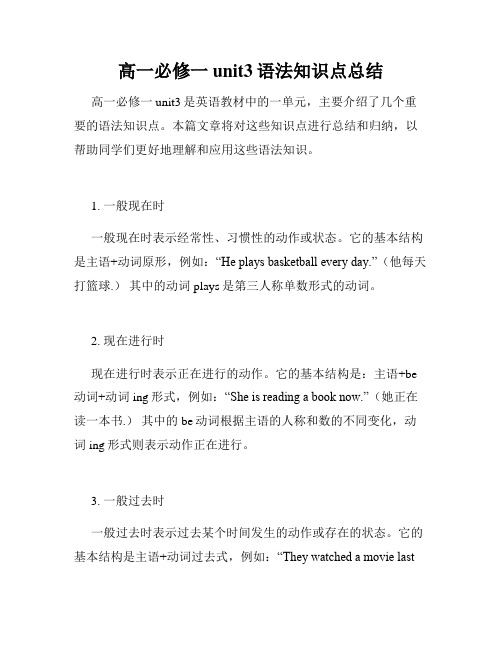
高一必修一unit3语法知识点总结高一必修一unit3是英语教材中的一单元,主要介绍了几个重要的语法知识点。
本篇文章将对这些知识点进行总结和归纳,以帮助同学们更好地理解和应用这些语法知识。
1. 一般现在时一般现在时表示经常性、习惯性的动作或状态。
它的基本结构是主语+动词原形,例如:“He plays basketball every day.”(他每天打篮球.)其中的动词plays是第三人称单数形式的动词。
2. 现在进行时现在进行时表示正在进行的动作。
它的基本结构是:主语+be 动词+动词ing形式,例如:“She is reading a book now.”(她正在读一本书.)其中的be动词根据主语的人称和数的不同变化,动词ing形式则表示动作正在进行。
3. 一般过去时一般过去时表示过去某个时间发生的动作或存在的状态。
它的基本结构是主语+动词过去式,例如:“They watched a movie lastnight.”(他们昨晚看了一场电影.)过去式的构成形式有规则变化和不规则变化,需要根据具体的动词来确定。
4. 过去进行时过去进行时表示过去某个时间正在进行的动作。
它的基本结构是:was/were+动词ing形式,例如:“I was studying when he called me.”(他给我打电话的时候,我正在学习.)过去进行时的be动词形式根据主语的人称和数的不同变化,动词ing形式则表示过去进行的动作。
5. 一般将来时一般将来时表示将要发生的动作或存在的状态。
它的基本结构是:will/shall+动词原形,例如:“I will go to Beijing next week.”(我下周将去北京.)不同的人称和数有不同的构成形式。
6. 现在完成时现在完成时表示过去某个时间开始的动作一直延续到现在,或者过去发生的动作对现在产生的影响。
它的基本结构是:have/has+动词过去分词,例如:“I have lived here for ten years.”(我住在这里已经十年了.) have/has的形式根据主语的人称和数的不同变化,动词过去分词则表示动作已经完成。
高一英语人教版必修一unit3 语法

A my mum with I've won a holiday for two to Florida. I___ me to have fun there. A. am taking B. have taken
C. take
D. will have taken
Exercise:
me up.
我正要去上班的时候,这时有人打电话给我。
Exercise:
--I have not finished my dinner yet.
D for us. --But our friends___ A. will wait C. have waited
B. wait D. are waiting
C. leaves; is leaving
D. is leaving; is leaving
Ladies and gentlemen, please fasten your seat belts. The plane__. B A. takes off B. is taking off C. has taken off D. took off Hurry up! The train___. B You know it___ at 8:30 am. A. leaves; leaves B. is leaving; leaves
表将来的其它表达方式:
1.be going to do: ①表示人主观上近期的“打算、意图、计划”等 E.g Are you going to visit the museum this afternoon? ②表示有某种迹象表明最近将会发生的事。 Look! It's going to rain.
- 1、下载文档前请自行甄别文档内容的完整性,平台不提供额外的编辑、内容补充、找答案等附加服务。
- 2、"仅部分预览"的文档,不可在线预览部分如存在完整性等问题,可反馈申请退款(可完整预览的文档不适用该条件!)。
- 3、如文档侵犯您的权益,请联系客服反馈,我们会尽快为您处理(人工客服工作时间:9:00-18:30)。
Book1 Unit 3 专题训练
一.完形填空
There was once a boy who liked nothing more in the world than to win. He loved winning at whatever it may be like football, cards, etc. Because he couldn’t stand losing, he had become a(n) __7__ in all kinds of tricks and cheating methods. He could play tricks in practically every situation, without being __8__.
He won so many times that almost no one wanted to play with him. One person who did play with him was a poor boy. Always making the boy look__9__, the champion really en joyed himself at the poor boy’s expense.
But the champion ended up getting __10__ with all this. He needed something more, so he decided to __11__ for the national video games championship, where he would find some competitors worthy of himself. At the championship he was keen to show his __12__, but when he tried using all those tricks and cheating methods, he knew, well … none of them worked. The __13__ had prevented any of the tricks from working.
He felt terribly __14__: he was a good player, but without his tricks, he couldn’t beat a single competitor. He was soon __15__, and sat there, sad and thoughtful. Finally, they __16__ the name of the champion. It was the poor boy. The one he had always beaten! The boy realized that the poor boy had been much __17__ than himself. It hadn’t upset the poor boy if he lost, because what he was really doing was __18__ from each of his defeats. And from the experience he had been transformed into a real __19__.
From then on, the boy who had loved winning __20__ wanting to win all the time. He was quite happy to lose sometimes, because that was how he would learn to win on the really important __21__.
7. A. expert B. official C. lover D. member
8. A. copied B. expected C. murdered D. noticed
9. A. ambitious B. ridiculous C. happy D. lucky
A. shocked
B. pleased
C. bored
D. excited 10
.
11
A. apply
B. look
C. stand
D. wait
.
A. appearance
B. problems
C. magic
D. skills
12
.
13
A. winners
B. players
C. judges
D. audience .
A. amazed
B. embarrassed
C. terrified
D. moved
14
.
A. defeated
B. caught
C. scolded
D. warned 15
.
16
A. announced
B. asked
C. sent
D. knew
.
A. richer
B. taller
C. heavier
D. cleverer 17
.
A. recovering
B. surviving
C. coming
D. learning 18
.
A. athlete
B. master
C. fighter
D. leader
19
.
A. argued for
B. kept on
C. gave up
D. thought of 20
.
A. advice
B. dates
C. influence
D. occasions 21
.
二.语法填空
Stephen Hawking, who is the most famous physicist, was born in Britain on January 8th, 1942. As a child, he was enthusiastic about 22 (design) complicated toys but 23 (fortune), in his twenties, he suffered 24 a disease that was impossible to be cured, 25 was a great challenge for him. However, not only was he positive about the misfortunes 26 eventually he defeated all the obstacles but also he was 27 (absorb) in his research in the universe. The year 1988 saw his best-seller A Brief History of Time, 28 which he put forward the idea 29 time itself has a beginning, and that it will have 30 end. In conclusion, he has made outstanding 31 (contribute) to the fields of cosmology and quantum gravity.
完型填空(每小题2分,共30分)
7-11ADBCA 12-16DCBAA 17-21DDBCD
语法填空(每小题1.5分,共15分)
22. designing 23. unfortunately 24. from 25. which 26.and
27. absorbed 28. in 29. that 30. an 31. contributions。
